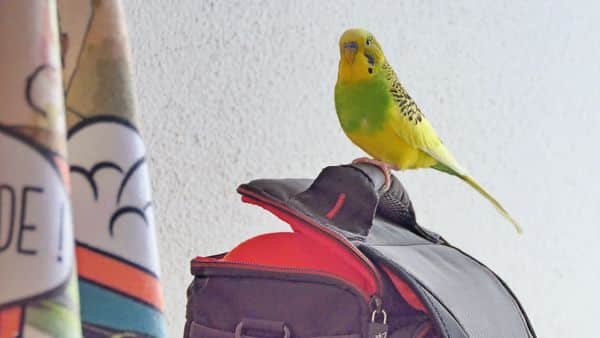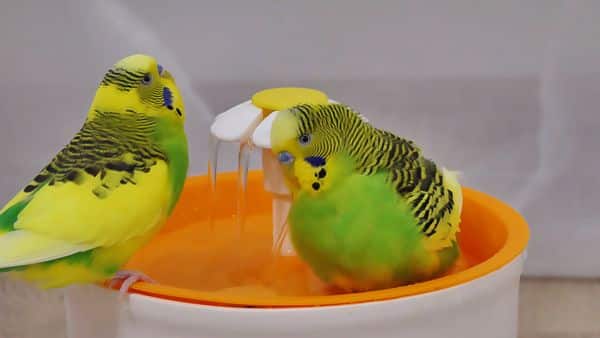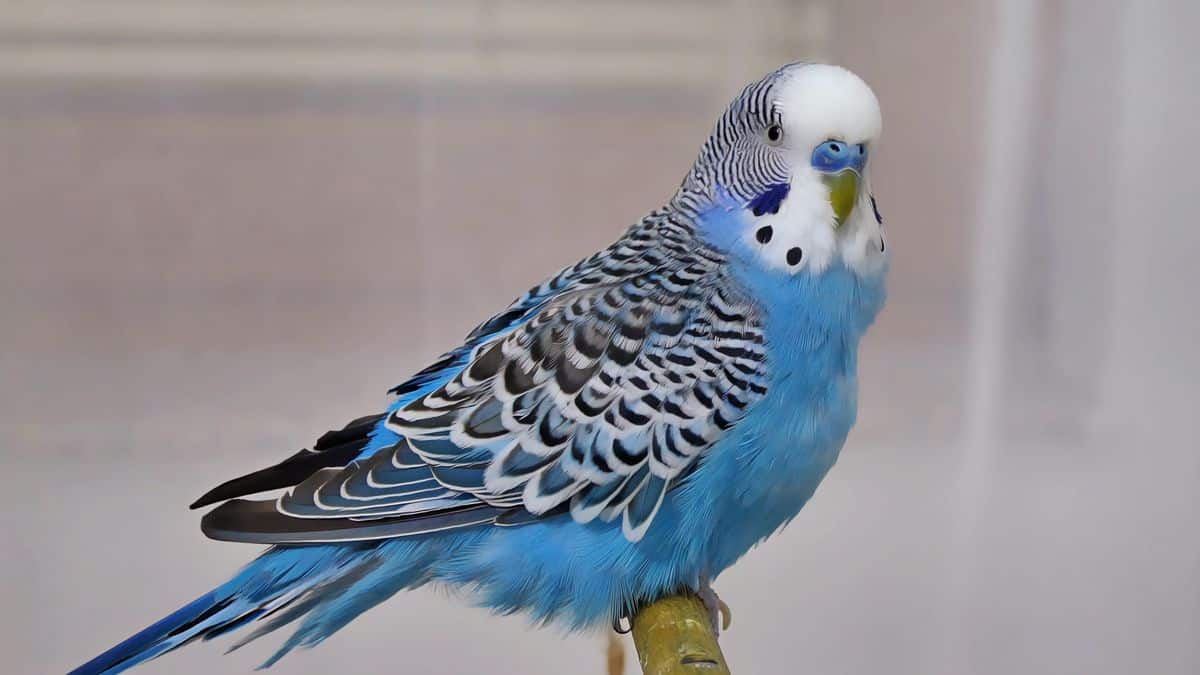After healing or even during the healing period, they’re likely to accept new mates. This article discusses budgie grief and other things you should know.
Being bereaved is emotional. People and animals are likely to be in grief. It’s entirely normal for you and your pet or budgie to get sad during and after a partner’s loss. Budgies express their sadness and affectionate through various symptoms and signs. Examples include feather plucking, appetite loss, voice change, aggressive behaviors, biting, change in sleep pattern, obsession, and calling for the partner.
As the budgie owner, having noticed the grieving symptoms, it’d be best if you start working towards asking it feel better. Professionals say that it’s usual for budgies to mourn their departed loved one for two to four hours. Therefore, it’s vital to give your budgie the support it deserves at this transition and readjustment stage of its life.
Budgies are so used to their partners in the cage. They chat, eat, play with toys, and do more other things together. That’s why if any of them dies and the other survives, the survivor will inevitably miss its companion. Your relationship with the remaining budgie determines whether you need a replacement or not. A number of factors, including your availability and care for the bird, may affect your decision on the better option. This article discusses a budgie’s grief and other things you should know. Keep reading.
Reasons for buggies’ grieving
Did you know that animals grieve similarly to human beings? Mourning is a great portion of strengthening animals’ relationships, as per genetics. Some birds, such as buggies and parakeets, need to stay with other bird flocks for building stronger relationships for survival and breeding. For instance, buggies are popularly monogamous and may merge with entering a relationship with their partners for some time.
A study indicated that buggies, once close together, then separated for over 70 days, can still recognize the partner’s voice. They develop a solid bond that makes sure they keep breeding. Getting bereaved is a natural stressor for most animals and may lead to psychological trauma. That’s why you should keenly observe your buggy’s behavior to understand how to help.
Signs of a grieving budgie
Are you convinced that budgies grieve after losing their partners? If no, then you should watch out for some signs and symptoms indicating sadness after a friend or companion dies. Seeing any of these alerts, don’t hesitate to give support. The following are some of the possible signs;
Behavior changes
Your budgie may start behaving unusually. You may notice it losing appetite, feather plucking, abnormal aggression, or an altered sleeping pattern. Such abrupt actions are a warning sign that your budgie is grieving. Therefore, it’s essential to be careful and observant during the first few days to help relieve as early as possible.
Extreme head bobbing
In many cases, head bobbing could mean that your budgie is hungry, happy, or simply looking for attention. It may seem normal, but doing it excessively following a partner’s death suggests that your bird is undergoing mental trauma. It may be a sign that they miss interacting with their companion.

What Can You Do to Relieve Your Buggy’s Stress?
Give more attention
Do you have time for your grieving buggy? It’d be best if you scheduled time to give attention to your budgie. Set aside at least ten to fifteen minutes daily to just interact. Find an unchanging time of the day, such as noon. Sticking to the same time every day is good for giving your bird certainty to calm it.
Your budgie would feel great if you kept walking around it, singing, talking to it, and playing games. By doing this, you’ll help develop a bond with you despite missing its mate. Take the opportunity of taming it if it’s not tamed, especially if not very scared about you. Consequently, your budgie will be busy. It won’t feel alone. Furthermore, you’d have tamed it.
Play fine music
Usually, you’ll find a bereaved budgie searching and calling the departed companion. But, playing soothing music using a radio or recorded audio is likely to destruct its mind and bring comfort. Sometimes, the budgie ay tries to perform a new song to you or learn from the ones you sing to it. Besides, you can take it near the television or let your recorded song sing around it even when you’re absent. You should find something to give it company.
Buying interactive budgie toys
Toys are an excellent way to keep your budgie active and having fun throughout. They give physical and mental stimulation- good for the budgie’s health. We’ve got several toy types. They could be made of wood, paper, cotton, plant, among others. Such materials resemble ones in the wild Australian environment. Get it different colors and textures to buster boredom, especially in your absence. Among the most favorite toys for budgies are perches, climbing, noise-making, and swing toys. However, there are other DIY toys personalized for your budgie.
Find a favorite type for them. Also, getting a simple wooden spool or Popsicle sticks are still a great way of giving your budgie entertainment and exercise. It’d be useful to get it the right toy size, that’s non-toxic and durable. Several types will help rotate old and new toys in its cage weekly to raise its curiosity. You note that a mirror won’t serve your purpose for your budgie.
Have a home holiday
Take your bird to newer surroundings. Go ahead, ride it on your shoulder as you go round exploring new environments. Make it have experiences for different places. For example, on the nightstand or table. You can also choose to move its cage near an area with light like the window. Doing this enables it to have a clearer outside view. Keep the window closed to avoid direct sunlight exposure.
Provide food
Do you know your budgie’s favorite foods? Entice it with its best meals. Apart from enjoying celery, carrots, apples, broccoli, and spinach as usual food staples, they also like silverbeet, apricots, cooked pumpkin, and parsley. Millet is another perfect food for treating your bad, please don’t forget it. While your bird’s meal should be limited, add a little honey for perking up the depressed budgie.
Allow your budgie to bid farewell
Is it possible to allow it to have the last look at the departed companion? It may seem a cruel thing to do, but it may help the budgie not call and search for the partner in vain. It helps the budge understand the companion’s finality and potentially develop some closure of the happening. Evidently, surviving budgies may show fewer stress signs and symptoms when seeing a lying picture of the fallen soul outside their cave.
Find a new friend
Just like human beings, budgies are social animals. You should consider getting it another partner or bird. A majority prefer staying with other groups or in pairs. Therefore, finding another friend will be helpful. They’re the kind of birds that quickly accept new partners. Start by introducing the stranger birds one by one. Make their cages closer to each other so they can learn one another’s voices. Then, you can observe to note if they’ve got an interest in each other.
Pay attention to their behavior. Are they chatting and tweeting back and forth? Or are they pecking and trying to fight? Look to see if they can be merged together for a play. Never force them together, more so cage sharing if they don’t seem prepared. They may not appreciate being in the same housing, however, being in a similar room can make them grateful for each other’s company. Again, don’t forget that a male and female or two males may get along better than a female and another.
Give enough time
Patience pays. You should be more patient with your little bird. Seeing your budgie grieve may be a difficult thing. It may even take longer than you expect to see it come out of the mourning period. Don’t you think he needs time for processing the loss? Please understand that grief is a form of paying respect to the departed. Allowing time and support will help it feel its old self once more, even before you can tell.

Give the budgie attention
You may eventually decide to get a new mate, but please don’t immediately replace the dead budgie. Use this particular moment to know your budgie even more and make the best of friends. Give it at least two or three playing sessions daily. Get it outside its cage and throw a small toy or ball several times until it reacts. Try ringing its bell, provide new foods, make repeated sounds to see if it imitates, and make it learn new techniques.
Consult a vet
You may have tried all the tips possible to help your bird get into a new normal but in vain. With increased grieving signs, you should be thinking about seeing a professional. Find a trusted vet or an animal behaviorist. Being watchful is better than assuming the adverse symptoms of your bird, not healing from its pain. You should understand that your budgie may display symptoms like those of any other bird in the morning. For this reason, you need an expert’s view to find a way forward.
What If My Budgie Lacks a Companion Forever?
Naturally, budgies are flock animals. They can also feel the gap left by their loved one- a partner. Nevertheless, just as humans do, some budgies feel fine staying alone. They mainly require having attended to by their favorite person. On the other hand, those that can’t stand loneliness after their partner’s fall need a one on one interaction with you every day to remain joyous. Otherwise, you should commit to getting them a new friend rather than leaving it to stay single.
Devoting time to your budgie may bridge a stronger bond with your budgie, and you may consequently tame it easily. Some single budgie owners are reporting that some effortlessly develop affectionate to them when left alone. Their desperation may even increase the chances of your budgie talking to you unlike before.
Points to note about Budgie grief
- The best choice for matching your surviving female budgie is a male. It’s almost obvious that a male and female are likely to stay together harmoniously.
- Expect too much bickering when you put two females together. They’ll mainly battle over a personal boundary, creating a lot of noise.
- If it’s a male, the best option for a friend is another male budgie. Male budgies are great friends. They interact cordially and sing to each other more frequently- they get along very well.
- Eliminate all potential nesting areas if you don’t want budgie chicks. Remove any possible thing that the birds could convert into nests. Ensure there’s no conducive mating environment.
- In case your single bird fails to show any interest in you or its environment, you should actually consider giving it a partner.
- You can always tell if your bird is happy by looking at its actions.
- If your budgie looks healthy and excited after the expected end of grieving time, you may overlook finding a friend.

The Bottom Line
It’s true budgies grieve and needs time to heal. After healing or even during the healing period, they’re likely to accept new mates. You may be worried about what to do when your bird is sad. Well, paying attention is the most important thing. Additionally, be on the lookout to observe any abnormal characteristics it displays. For example, feathers coming out, losing appetite, aggression, and others. It may also keep raising the head, looking side to side, and moving all over the cage as though seeking attention.
We’ve got various ways of helping your bird undergo the healing process after a mate’s death. For instance, giving attention, providing food, introducing a new friend, not rushing to replace, and practicing patience. Any decisions you make, be sure your single budgie will appreciate every effort you input to console. If you’re a committed budgie owner, you’ll definitely dedicate to taking your bird through the grieving period. You might as well form a stronger relationship with your feathered buddy because of the care.
Recent Posts
Have you ever dreamt of personalizing everyday objects or unleashing your creative spirit through precise, detailed engravings? Look no further than the Longer RAY5 20W Laser Engraver, a powerful...
Imagine a world where your imagination can paint pictures. That's the power of artificial intelligence (AI) in the realm of art, and budgies, those vibrant and curious companions, are taking center...


